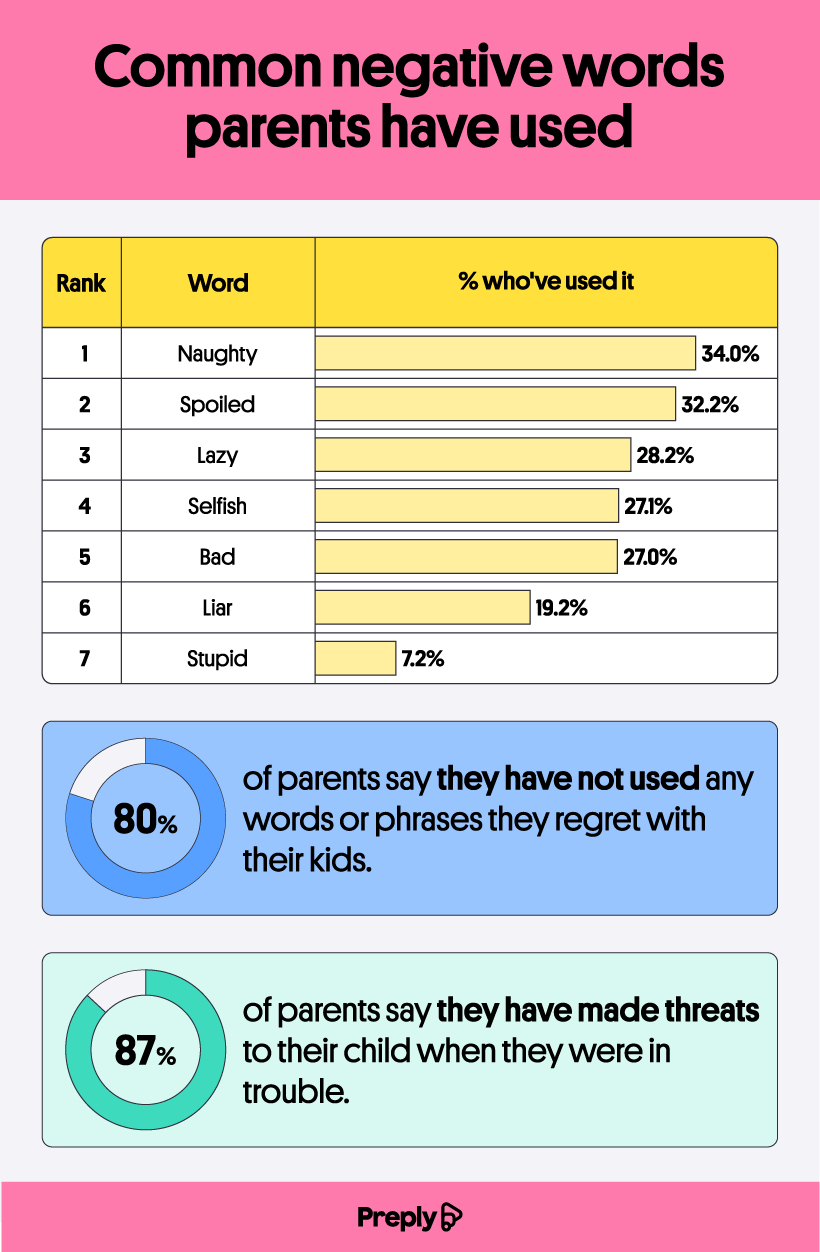Hey parents, let's talk about those negative words we use with our kids

As parents, we're constantly bombarded with advice on how to raise our little ones. From what to feed them to how to discipline them, it seems like everyone has an opinion. But have you ever stopped to think about the words you use when talking to your kids? A recent study has revealed the top negative words parents use, and the results might surprise you.
Preply, an online language learning marketplace, surveyed over 1,400 parents across the US to find out how we're using language with our kiddos. And let me tell you, the results were eye-opening.
The study found that the most common negative words parents use are "naughty," "spoiled," "lazy," "selfish," "bad," "liar," and "stupid."
Ouch!
It's no wonder that one in four parents admitted to making their child feel selfish or bad, and nearly 1 in 5 have caused their child to think of themselves as a liar.

But here's the thing: many parents are starting to realise the impact of their words. The study found that 20 per cent of parents express remorse over the negative words they've used, and one in 12 regret cursing in front of their kids.
It's a step in the right direction, don't you think?
Interestingly, 61 per cent of Americans wish their own parents had used language differently with them. This sentiment is especially strong among Gen Zers and millennials, who often view older generations' parenting styles as overly negative.
But many parents are working to break that cycle. Nearly half of parents with daughters are careful about using terms like "pretty" and "beautiful," while 38 per cent of parents with sons are mindful about using words like "strong" and "brave."
It's all about avoiding those pesky stereotypes and focusing on what really matters.

So, what's the deal with parenting styles these days? According to the study, 45.5 per cent of American parents describe their approach as "lighthouse parenting," which is all about guiding and supporting kids while giving them the freedom to explore. Other popular styles include attachment parenting (13 per cent) and gentle parenting (12.9 per cent).
Sylvia Johnson, a language expert and mom of three girls, says that this shift towards gentle parenting reflects changing cultural norms.
"Language and communication styles are a mirror for changes in society," she tells Scary Mommy. "The shift towards gentle parenting is a reflection of these evolving cultural norms, where language is used as a tool for understanding and guiding rather than commanding."
At the end of the day, there's no one-size-fits-all approach to parenting. But research consistently shows that a nurturing, communicative approach that balances clear boundaries with promoting independence and self-expression is the way to go.
As Johnson puts it, "As parents, we should strive for a style that is responsive, warm, understanding, yet also firm, consistent, and fair. I suggest aiming to create an environment where open communication thrives, which leads to strong parent-child relationships and promotes a child's emotional, social, and cognitive development."
So parents, take a moment to reflect on the words we use with your kids. By being more mindful of your language and focusing on positive communication, we can create a brighter future for your little ones.
As Johnson says, "Language constantly evolves, and greater awareness of how we use it, especially with our children, reflects growth. It suggests a move towards a more understanding and inclusive society. It's a hopeful sign for the future."
Let's embrace this change and do better, together. Our kids deserve it.
ALSO READ: The mumfluencer and the unrealistic expectations in motherhood
This article was first published in theAsianparent.